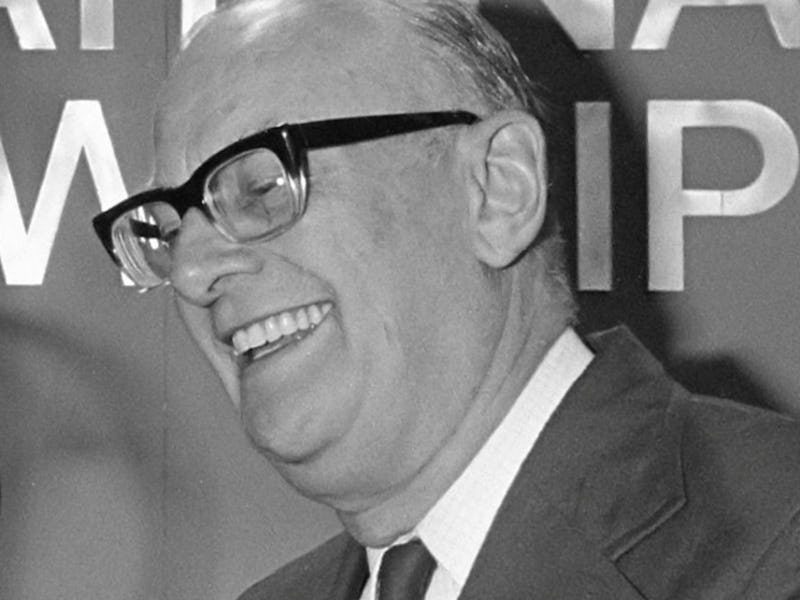Arthur C. Clarke Will Be Right When We Have Both the Internet and the Hyperloop
Envisioning a future in which we'd all work remotely, Arthur C. Clarke predicted we'd no longer want or need cities.

“It will be possible, in that age, perhaps only 50 years from now, for a man to conduct his business from Tahiti or Bali just as well as he could from London.” - Arthur C. Clarke, 1964
In 1964, the New York World’s Fair became a futurology symposium. Luminaries like Isaac Asimov and Sir Arthur C. Clarke were asked to predict what life might look like in 50 years — then asked again and again. Clarke’s answers ranged from the fascinating to the decidedly middle class, but he set himself apart by having the humor to poke fun at the prediction racket, saying that non-shocking predictions would likely be wrong. Then he went ahead and shocked people.
And he got most of it wrong anyway — despite making a number of correct smaller predictions.
Clarke spoke, for instance, of using biological engineering to make use of chimp servants and of a time when our human bodies would become obsolete. These are pretty fanciful notions, but perhaps one of his most intriguing predictions was his suggestion that in the future, our work would no longer require us to be in the same physical space as whatever we were working on — or who we were working with.
Clarke predicted a time when technology would free us from the tethers of physicality, demanded by even the most hands-on professions. In saying that a man could “conduct his business from Tahiti or Bali just as well as he could from London,” he wasn’t just talking about telecommuting — he was talking about being able to phone it in for all sorts of things. He goes on to say that one day, brain surgeons in Edinburgh could be performing on patients in New Zealand.
It seems pretty far-fetched. But it has come to pass — in a sense.
In 2001, a surgeon from France performed surgery on a patient in New York using robots that he controlled remotely, conducuting the first truly remote surgery. It wasn’t brain surgery; but it was about 13 years ahead of schedule for Clarke’s timeline. The practice isn’t common, but this first surgery, called “Operation Lindbergh” was certainly proof of concept.
That said, the rest of Clarke’s prediction seems doubtful. Clarke suggests that with the freedom provided by remote work, cities will cease to exist because we’ll no longer need them. He says that we’ll no longer commute and that we won’t need to travel for business, only for pleasure.
Perhaps the theory is sound. After all, if you can do surgery remotely, what can’t be somehow hacked into remote submission? But what Clarke didn’t account for is the fact that even if you could remove the necessary physicality from absolutely every job, every task, humans sort of like cities. That’s why people keep moving to them.
They’re hubs of opportunity and creativity not because most jobs still demand that we be physically present, but because it’s sort of human nature to crave human interaction IRL —or “meatspace”, if you will. Cities are the places where people are given unprecedented access to culture, to creative opportunities, and to collaboration. It’s difficult to imagine people wanting to give that up in any future.
Population density certainly presents problem, but it’s got advantages, too. Moreover, what’s the alternative? Sprawl, no doubt.
If everyone were to suddenly crave moving out of the city to find their own slice of uncrowded paradise, we’d see communities clawing their way outward from cities and into untouched land. We’d see more of our rapidly shrinking reserves of natural land taken over by humans. Slowly, development would stretch further and further from metro areas, supply lines would be created and we’d need more and more robots to bridge the gaps between humans and the amenities they desire.
Clarke, of course, recognizes this, saying, ““I only hope that when that day comes and when the city is abolished, the whole of world isn’t turned into one giant suburb.” Beyond that, it’s unclear what Clarke thought we might do with what was left of New York City after everyone moved out of it. Did he imagine it might be just glass and concrete and stone? Just a house not a home? It’s unclear.
In the end, Clarke got it sort of right, which is often how these thing go. We are, more than ever before, able to do our work remotely. Many of us work in cities all over the world while living in none of them. Our current ability to see and do and create across vast distances would’ve seemed like pure science fiction to anyone from the ‘60s, and that’s exactly what Clarke was suggesting.
We likely won’t see the demise of cities anytime soon. Cities are the foundation and the result of centuries of human evolution. We congregate, we interact, we create, we grow, and for the most part, we like to do that in person. What’s more, we like the convenience that comes with having everything we need in one damn spot. As long as there’s ambition, there will be cities, at least in some form. For now, the great suburban wasteland of the world hasn’t come to pass. Maybe in an alternate future.